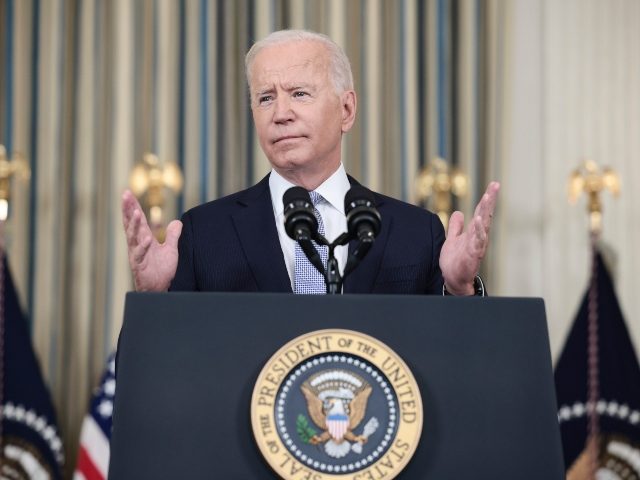“There’s nobody suggesting there’s unchecked inflation on the way — no serious economist.”
Those words should be carved upon the grave of Joe Biden’s presidency. They were spoken by President Biden himself at a White House press conference in July of 2021. The Consumer Price Index (CPI) had climbed to an annual increase of 5.3 percent, the fastest rate of price hikes since the summer of 2008. The media was treating inflation like it was nothing more than a bogeyman meant to scare the public for partisan ends. The Federal Reserve insisted inflation was caused by those infamous “transitory” forces related to the reopening of the economy and temporary supply chain snarls. Nobel Prize economist Joseph Stiglitz said inflation was a “red herring designed to distract us” from the really important work of the Biden administration.
It was not ever true, of course. Larry Summers, who is such a deadly serious economist that escaping one of his lectures without falling prey to somnolence ought to be considered an act of heroism, warned in a February 4, 2021, Washington Post op-ed that Biden’s $1.9 trillion American Rescue Plan was too big and risked setting off inflation. That was less than a month into the Biden administration. Olivier Blanchard, the former chief economist of the International Monetary Fund and perhaps the most cited economist in the world, was also sounding the alarm. The Biden administration, however, preferred to pretend these economists did not exist.
Now here we are, just over a year into Biden’s presidency, and inflation is indeed “unchecked.” The Labor Department said Thursday that the Consumer Price Index rose a seasonally adjusted 0.8 percent in February, an acceleration from the month-over-month pace of 0.6 percent hit in January. That puts the CPI at 7.9 percent above its year-ago level, the largest increase since 1982. Core prices, which exclude food and energy and are thought to be a better reflection of underlying price trends, were up 6.5 percent compared with a year ago, the most since August 1982. Even if you shave off the biggest moving prices, as the Cleveland Fed does with its trimmed mean inflation, annual price increases jumped to 5.7 percent from 5.4 percent in January. In other words, inflation is becoming more widespread and more ingrained in the economy.
In another sign that inflation is becoming more “unchecked,” the driver of inflation has been handed from goods to services. Goods prices rose just 0.4 percent in February. That would be a frighteningly high number in ordinary times, but this year it comes as a relief, the slowest gain since September. Used car prices actually ticked down a bit. They’re now only up 41.2 percent year over year. New car prices are up 12.4 percent, bringing to mind the joke that people are buying new cars and flipping them as used cars for a profit. Appliance prices are still rising but not quite as quickly as they were.
On the services side, which is by far the bulk of U.S. economic activity, inflation accelerated. Excluding energy services, prices jumped 0.5 percent from January, the biggest monthly gain since 1992. Compared with a year ago, core services prices are up 4.4 percent, also a 30-year high. Needless to say, it’s not the price of gas or shortages of microchips or traffic jams in ports that are driving services prices up. This is purely inflation and suggests that even if we clear up the supply chain problems – something we’ve been told will happen real soon now for nearly a year – inflation will stick with us.
The White House wants us to think about these price hikes as somehow the fault of Putin. That’s confounded by the fact that economists were expecting around 7.9 percent inflation before Russia invaded Ukraine. The invasion didn’t happen until the end of February, meaning it would not show up in most prices for that month. In any case, it is hard to believe that Putin could be responsible for soaring prices of pets, veterinary care, bacon, and breakfast cereal. Putin may be sinister, but we have seen no evidence that he’s cornered the market on Cheerios, Lucky Charms, and Coco Puffs.
This month’s headline inflation numbers, which will be released around four weeks from now, will reflect the soaring fuel and commodities prices that we’ve seen since the invasion. Gas prices, for example, may be up 30 percent for the month. According to the Labor Department, that makes up around 3.7 percent of consumer spending. Add in the spillover effects into other areas, such as travel and transportation, and we might be looking at inflation creeping toward double digits. Of course, gas prices may diminish spending elsewhere in the economy, which would offset some of the inflationary effects.
But even if the Russia situation is somehow resolved quickly, inflation is now here to stay for the foreseeable future. We will not say no serious economist believes we can overcome it this year. But that’s only because we’ve come to think of that phrase as a kind of jinx that we would rather avoid.

COMMENTS
Please let us know if you're having issues with commenting.